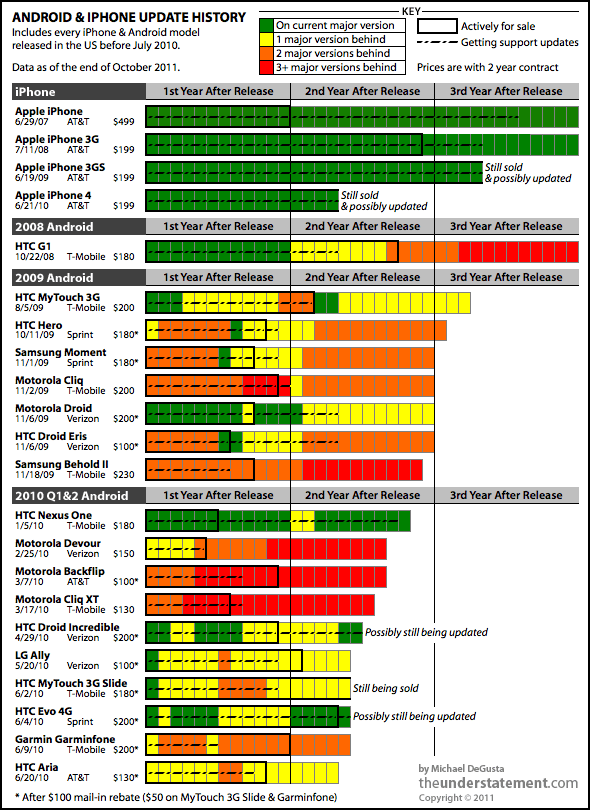 As Android pumps out the latest and greatest operating systems, many older versions are being left by the wayside. When older operating systems are unable to update or are too muddled to perform this task for any reason, this is called fragmentation. Steven J. Vaughn-Nichols explains it like this - all of the original equipment manufacturers (OEMs) like Motorola and HTC put their own software, Sense UI, and Motoblur on top of Android. Then, all of the other developers add their own "special sauce" of applications. On top of this, there are multiple current versions of Android out and supported by the same hardware.
As Android pumps out the latest and greatest operating systems, many older versions are being left by the wayside. When older operating systems are unable to update or are too muddled to perform this task for any reason, this is called fragmentation. Steven J. Vaughn-Nichols explains it like this - all of the original equipment manufacturers (OEMs) like Motorola and HTC put their own software, Sense UI, and Motoblur on top of Android. Then, all of the other developers add their own "special sauce" of applications. On top of this, there are multiple current versions of Android out and supported by the same hardware.
So what does this mean to you? With so many out-of-date operating systems, it is even harder for app developers to come out with quality content at the same rate as an iPhone developer. It is also harder to make sure your new Android investment withstands the test of time. Developers have been complaining about this for a while now, with Google exec's sweeping it under the rug. While Google developers insist that Android fragmentation is a red herring, many industry insiders think otherwise. In a Baird research poll of 250 working developers, 87% (217) of them view Android's fragmentation as a problem. Maybe now Google will take it seriously. I know what you're thinking - "but SureTech, I'm a visual person, show me what this means," or better yet "surely MY android isn't affected."
Michael Degusta compiled a chart of Android phones and their problem with updating old operating systems. Through his research, DeGusta was able to go back and find every Android phone shipped in the US up to the middle of last year and track down each update - be it a major OS upgrade or a minor support patch. He then compared the dates and versions of these phones to the systems released at the time. The result? Well, let's just say Google won't be winning any up-to-date software awards. See how Android devices compare when it comes to receiving software updates in the chart below.
Apple is different in that they only have one medium to go through when it comes to system upgrades. They have the ability to update your iOS on the first day it is available, simply because Apple has a direct relationship with its phone owners. On the other hand, Android has to deal with cell phone manufacturers and conservative carriers to send an update. DeGusta concludes "In other words, Apple's way of getting you to buy a new phone is to make you really happy with your current one, whereas apparently Android phone makers think they can get you to buy a new phone by making you really unhappy with your current one."
So do you prefer trending towards Standardized Happy or Experimental Frustrating? The choice is yours, isnt that grand?
^CM


